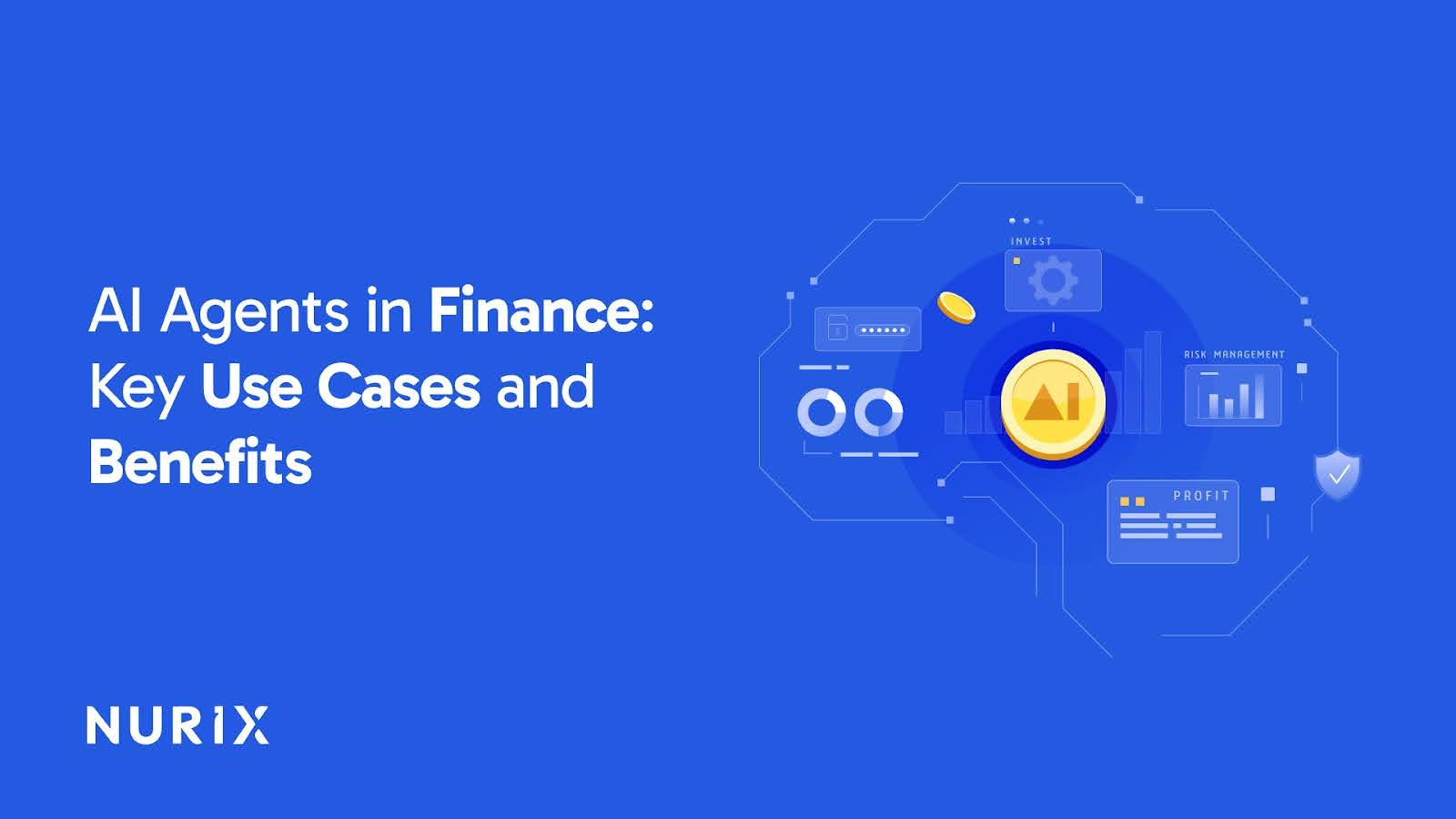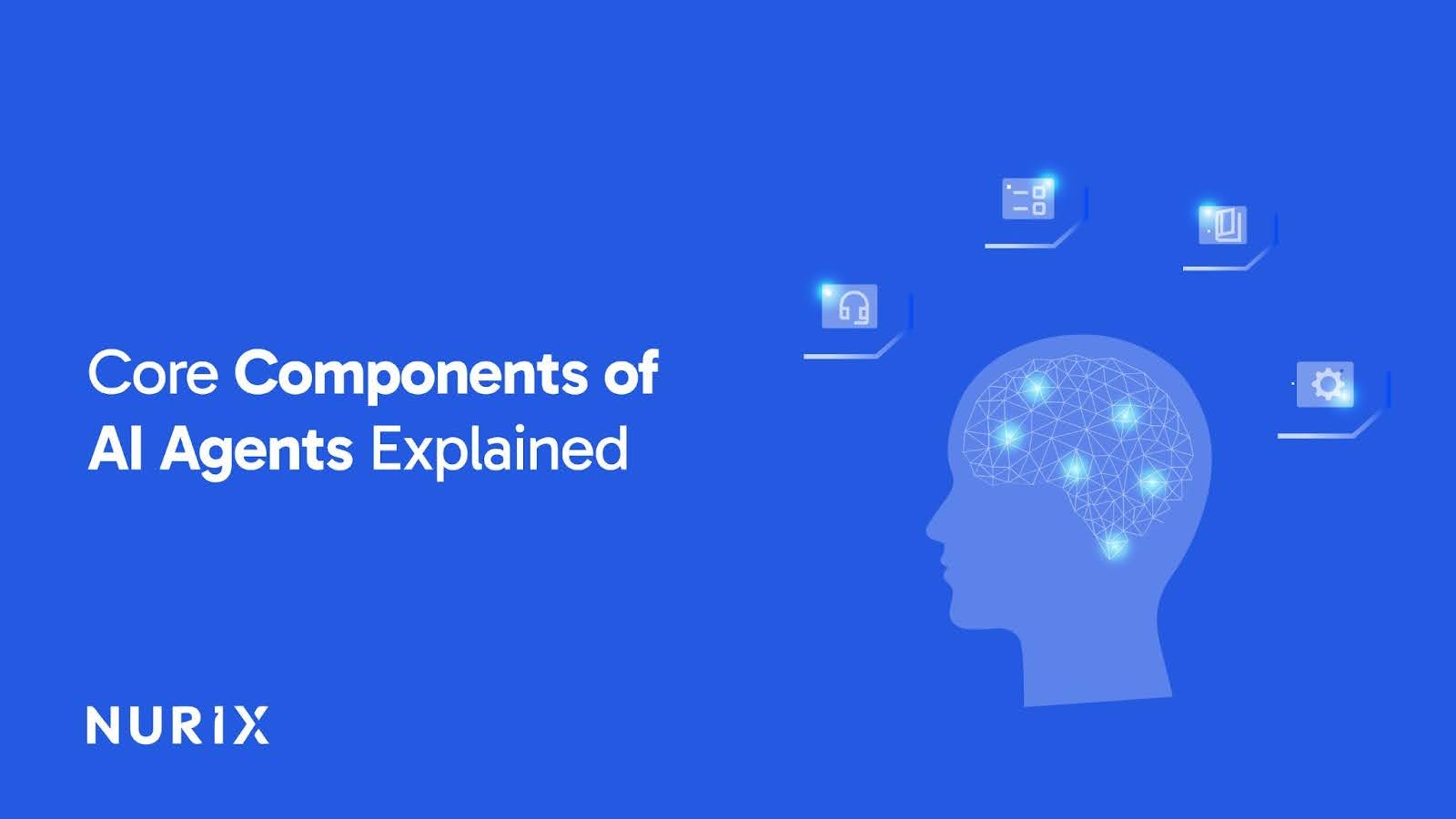AI Agents in Finance: Key Use Cases and Benefits

The pace of financial markets leaves no room for hesitation. What if there were a way to anticipate shifts before they happen, catch risks before they escalate, and handle complex decisions almost instantly? AI agents in finance are stepping into that space, quietly changing the way money moves, deals are made, and risks are managed.
With the global AI agent market in financial services projected to approach $9 billion by 2032, it’s clear this isn’t just a phase that will die down. These systems are proving their worth in a high-stakes environment where milliseconds matter, and traditional approaches can’t keep up.
In this blog, we’ll uncover where AI agents are making real impact, from the trading floor to compliance teams, and how they’re quietly transforming financial decision-making.
Takeaways:
- Autonomous Handling of Complex Tasks: AI agents analyze diverse financial data to detect fraud, trade, monitor compliance, and assess risks with minimal human input.
- Speeding Up Slow Manual Processes: AI agents eliminate delays caused by manual data processing, risk checks, trade execution, and regulatory compliance by working in real-time.
- Proven Impact Across Use Cases: From cutting fraud false positives by 90% to reducing credit defaults by over 30%, AI agents deliver measurable improvements in trading, loan processing, customer support, and reporting.
- Critical Factors for Reliable Use: Success depends on accurate domain data, ongoing model retraining, expert oversight for edge cases, and strong security measures.
- Expanding Role in Finance Decisions: By 2028, AI agents will autonomously handle a significant share of daily decisions, evolving from support tools to core financial decision-makers.
What are AI Agents?
An AI agent is an autonomous software system designed to perform complex functions by continuously analyzing data, evaluating context, and executing appropriate actions with minimal human oversight. Unlike traditional automation that follows fixed rules, an AI agent adapts its decisions dynamically based on changing inputs and business objectives. It operates independently across multi-step processes, such as risk assessments, transaction monitoring, or regulatory compliance, while interfacing with various data sources and enterprise platforms.
Through continuous learning, the agent refines its capabilities by analyzing past outcomes and environmental shifts, leading to more precise and relevant decisions over time. It also proactively manages compliance and risk controls in real time, often interpreting incomplete or ambiguous information by using pattern recognition and context to maintain effective operation even when faced with imperfect data. This combination of autonomy, adaptability, and integration distinguishes AI agents as advanced tools within complex business environments.
Why Finance Industries are Looking to Invest in AI Agents?
While the finance sector knows the promise of AI agents in finance, it’s the persistent challenges of time-consuming, manual approaches that keep pushing organizations to embrace these new solutions. Let’s take a closer look at the traditional methods holding things back.
- Lengthy Manual Data Processing: Traditional financial analysis involves handling enormous volumes of diverse data, requiring extensive time for collection, cleansing, and organization before any actionable insight can be drawn.
- Complex Risk Evaluations: Manually assessing creditworthiness, market risks, and compliance demands substantial expert involvement, involving cross-referencing multiple data sources and regulatory frameworks, which delays decision-making.
- Slow Trade Execution: Human-operated trade decisions often lag due to the time required for real-time data interpretation, strategy adjustments, and regulatory checks, which can result in missed opportunities or increased exposure.
- Intensive Fraud Checking Procedures: Conventional fraud detection depends heavily on retrospective manual reviews and rule audits, which can be labor-intensive and slow to respond to emerging or subtle fraudulent patterns.
- Time-Consuming Regulatory Compliance: Monitoring transactions and communications for adherence to evolving legal regulations requires continuous human oversight, detailed documentation, and frequent audits, creating bottlenecks.
- Delayed Customer Query Resolution: Handling financial service inquiries through human agents can lead to longer wait times and inconsistent responses, especially during peak periods or with complex account issues.
- Resource Drain on Portfolio Adjustments: Active portfolio management traditionally demands repeated analysis of market changes and performance metrics, consuming skilled professionals’ hours and delaying rebalancing actions.
Once the obstacles of manual processes are clear, it’s worth looking at where AI agents in finance step in and deliver concrete value across operations, from fraud detection to portfolio management.
Here is an interesting read: How AI is Transforming the Insurance Industry: Benefits and Use Cases
Top Use Cases of AI Agents in Finance
Talk is easy when it comes to AI agents in finance; what counts are the specific areas where their impact is tangible and measurable. Let’s look at the key ways these agents are changing how finance gets done day-to-day.
1. Fraud Detection and Prevention
AI agents continuously monitor financial transactions in real-time to identify suspicious patterns and prevent fraudulent activities before they cause damage.
What it does for financial industries:
- Real-time Transaction Monitoring: AI agents scan millions of transactions per second, identifying unusual spending patterns, location anomalies, and behavioral deviations that indicate potential fraud.
- Pattern Recognition Accuracy: These systems reduce false positives by up to 90% while detecting emerging fraud schemes that traditional rule-based systems miss.
- Automated Response Systems: AI agents can instantly freeze suspicious accounts, send alerts to customers, and initiate verification processes without human intervention.
2. Algorithmic Trading and Investment Management
AI agents execute trades, manage portfolios, and make investment decisions based on market conditions and predefined strategies.
What it does for financial industries:
- High-Frequency Trading Execution: AI agents process vast amounts of market data in milliseconds to execute trades at optimal prices, capturing opportunities human traders would miss.
- Portfolio Optimization: These systems continuously rebalance portfolios based on risk tolerance, market conditions, and performance goals, adapting strategies in real-time.
- Predictive Market Analysis: AI agents analyze historical data, news sentiment, and market indicators to forecast price movements and identify profitable trading opportunities.
3. Credit Scoring and Risk Assessment
AI agents evaluate creditworthiness using comprehensive data analysis, providing more accurate risk assessments than traditional methods.
What it does for financial industries:
- Alternative Data Integration: AI agents analyze non-traditional data sources, including social media behavior, transaction patterns, and employment history, to assess credit risk more accurately.
- Default Risk Reduction: These systems reduce default rates by over 30% through improved risk prediction models that consider hundreds of data points.
- Automated Decision Making: AI agents can approve or decline loan applications in seconds, processing applications 24/7 while maintaining consistent evaluation criteria.
4. Customer Service and Support Automation
AI agents handle customer inquiries, process requests, and provide personalized financial guidance through multiple communication channels.
What it does for financial industries:
- 24/7 Customer Support: AI agents resolve up to 80-90% of routine banking inquiries, including balance checks, fund transfers, and account management tasks without human intervention.
- Personalized Financial Advice: These systems provide customized investment recommendations and financial planning guidance based on individual customer profiles and goals.
- Multi-channel Communication: AI agents interact with customers through chatbots, voice assistants, and mobile apps, maintaining conversation context across all touchpoints.
5. Regulatory Compliance and Risk Management
AI agents monitor transactions and activities to ensure adherence to financial regulations and identify compliance violations.
What it does for financial industries:
- Automated Compliance Monitoring: AI agents continuously scan transactions for anti-money laundering violations, sanctions compliance, and regulatory breaches, reducing manual oversight by 70%.
- Real-time Risk Assessment: These systems identify and assess operational, market, and credit risks in real-time, providing early warning systems for potential issues.
- Regulatory Reporting Automation: AI agents generate required regulatory reports automatically, ensuring accuracy and timeliness while reducing audit preparation time..
6. Financial Planning and Robo-Advisory Services
AI agents provide automated investment advice and portfolio management services to retail and institutional clients.
What it does for financial industries:
- Automated Investment Management: AI agents create and manage diversified portfolios based on client goals, risk tolerance, and market conditions, rebalancing automatically as needed.
- Cost-Effective Advisory Services: These systems provide professional-grade financial advice at a fraction of traditional advisor costs, making wealth management accessible to smaller investors.
- Goal-Based Planning: AI agents track progress toward financial goals and adjust strategies accordingly, providing regular updates and recommendations to clients.
7. Financial Reporting and Analysis
AI agents automate the preparation of financial statements, reports, and analytical insights for internal and external stakeholders.
What it does for financial industries:
- Automated Report Generation: AI agents compile financial data from multiple sources to create accurate balance sheets and income statements.
- Anomaly Detection: These systems identify discrepancies and unusual patterns in financial data, flagging potential issues before they impact financial reporting.
- Real-time Financial Insights: AI agents provide continuous monitoring of financial performance, generating alerts and recommendations based on key performance indicators.
8. Loan Processing and Underwriting
AI agents streamline the loan approval process by automating documentation review, risk assessment, and decision-making.
What it does for financial industries:
- Document Processing Automation: AI agents extract and verify information from loan applications, tax returns, and supporting documents, reducing processing time by over 90%.
- Income Verification: These systems automatically verify borrower income from multiple sources, including bank statements, employment records, and transaction data.
- Dynamic Risk Pricing: AI agents adjust interest rates and loan terms in real-time based on comprehensive risk assessments, optimizing both profitability and approval rates.
Knowing where AI agents in finance make a real impact is just the first step; getting the most out of them calls for a clear approach that matches those strengths with practical, ongoing strategies.
How to Make the Best Out of AI Agents in Finance?
To extract the highest value from an AI agent in finance, businesses should adopt specialized strategies, focus on ongoing adaptation, and maintain a data-centric approach. The following expert practices help move beyond surface-level adoption and address core operational and strategic gains:
- Set Precise, Impact-Focused Goals: Define measurable outcomes related to revenue, risk, compliance, or operations to guide AI agent deployment and measure success.
- Maintain Rigorous, Domain-Specific Data Quality: Implement strong data validation and anomaly checks to provide accurate and relevant financial data continuously.
- Combine Diverse Machine Learning Models: Use multiple ML techniques (forecasting, anomaly detection, sentiment analysis) together to improve prediction accuracy and capture complex market signals.
- Continuously Update and Monitor AI Models: Retrain regularly on new data to adapt to changing conditions, with automated alerts to detect performance issues or data drift.
- Incorporate Human Oversight and Transparency: Engage experts for critical decisions and ensure AI outputs are explainable and auditable to meet regulatory requirements.
- Apply Strict Security and Access Controls: Limit AI agent permissions with segmented APIs and role-based authentication to safeguard sensitive data and operations.
- Test Resilience and Compliance Regularly: Perform stress tests and adversarial scenarios while keeping AI aligned with current regulatory standards.
- Streamline Workflow and Validation Practices: Establish clear handoff protocols between AI and human teams and run shadow testing to validate AI performance before full integration.
- Choose Scalable, Supported Technology Solutions: Select flexible AI frameworks and reliable vendors that enable quick updates and accommodate evolving financial demands.
Getting AI agents in finance working well requires more than setup; it means anticipating the real hurdles that can slow or complicate adoption. Let’s look at the common challenges businesses face when putting these tools to work.
Read more: AI Chatbots for Banking and Finance Management
Challenges Businesses May Face During Implementation of AI Agents in Finance
Rolling out AI agents in finance comes with its own set of real-world bumps, obstacles that can slow progress despite clear benefits. Here’s a look at the practical challenges that often surface during adoption.
Facing upfront challenges doesn’t slow progress for long; what comes next are the shifts and advances defining where AI agents in finance are headed and how they’ll shape decisions to come.
Future Trends of AI Agents in Finance
The role of AI agents in finance isn’t static; it’s quietly expanding toward greater autonomy and deeper involvement in core decisions. Here are key developments that signal where this shift is headed.
- Decision Autonomy: By 2027, 50% of business decisions will be augmented or automated by AI agents. In financial services specifically, at least 15% of day-to-day work decisions will be made autonomously through agentic AI by 2028.
- Market Integration: By 2028, 33% of enterprise software applications will include agentic AI, up from less than 1% in 2024. AI-driven investment tools will become the primary source of advice for retail investors, with usage projected to reach 80% by 2028.
- Autonomous Operations: The robo-advisory market will grow from $8.39 billion in 2024 to approximately $33.6 billion by 2030, with a compound annual growth rate of 26.4%.
- Full Autonomy: By 2030, 64% of CFOs expect to run autonomous finance models. AI agents will manage complete financial ecosystems with minimal human oversight, creating "Economic Consciousness Networks" where millions of AI agents interact autonomously.
How Nurix AI Can Help Finance Teams With the Help of AI Agents
Nurix AI delivers conversational AI agents that help financial organizations slash manual work, speed up response times, and win more customers. With sub-second, human-like voice capabilities, our agents handle over 250,000 monthly conversations, driving 50% productivity gains and 65% lower operational costs.
What Nurix AI Agents Do in Finance:
- Instantly qualify and route leads after personalized, intelligent conversations.
- Handle customer onboarding and KYC in minutes, not weeks.
- Extract data from loan docs, flag missing info, and recommend next steps.
- Automate account inquiries, payments, and renewals, 24/7.
- Spot fraud patterns and monitor compliance in real time.
- Boost customer satisfaction with proactive financial advice and reminders.
Nurix AI’s secure, regulatory-compliant platform integrates with your existing systems, helping finance teams deliver fast, frictionless client experiences and measurable ROI.
Final Thoughts!
AI agents in finance are moving well beyond automated routines into realms that require nuanced understanding and swift, complex decision-making. They no longer just execute tasks but actively influence how risk is assessed, opportunities are identified, and compliance pressures are managed. The subtle interplay of algorithms and contextual data helps reduce delay and uncertainty, revealing advantages not through flashy headline claims but through consistent, measurable improvements in day-to-day operations.
As the financial sector continues to embrace these technologies, solutions like Nurix AI represent a clear step forward. Designed with real-world challenges in mind, Nurix AI offers tools that integrate multiple data streams, adapt to shifting market signals, and maintain transparency needed for regulatory confidence. Get in touch with us!
Yes, unlike rule-based bots, AI agents assess context and learn from outcomes, enabling them to resolve missing or conflicting data points, such as matching transactions without complete documentation.
No, they actively trigger actions, such as flagging mismatches, escalating issues, or even fixing them, across multiple systems like ERPs, CRMs, and ticketing tools without human prompting.
AI agents incorporate shifting customer behaviors and external industry trends in real time to deliver nuanced, multi-layered forecasts far beyond static projections.
Having too many AI agents can lead to complexity and miscommunication; targeted deployment focusing on key processes typically yields greater clarity and better results.
Yes, they evaluate ongoing financial activity on the fly, intervening immediately in cases like suspicious transactions or market shifts, rather than waiting for batch updates or manual reviews









